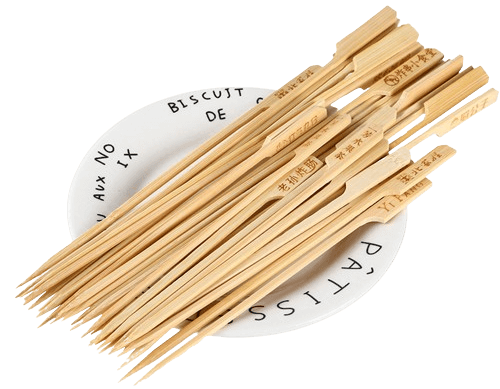At Ecostix Global, our mission is to revolutionize the way the world sees bamboo products. We strive to create high-quality, sustainable bamboo chopsticks and sticks that are not just utensils but symbols of a more eco-conscious lifestyle. Our focus is on blending traditional craftsmanship with modern innovation to produce items that are both environmentally friendly and aesthetically pleasing. We aim to inspire a shift towards sustainable practices in everyday life, making a positive impact on the environment while serving the practical needs of our customers. Our vision extends beyond being a leading manufacturer of bamboo products. We aspire to be at the forefront of sustainable living, influencing global trends and setting new standards in the industry. We envision a future where bamboo, as a renewable and versatile resource, is integral to daily life worldwide, reducing reliance on non-renewable materials. Our goal is to foster a world where sustainability is not a choice but a natural way of living, ensuring a healthier planet for future generations.
Key Takeaways
| Question | Answer |
|---|---|
| What is the first step in making bamboo skewers? | Harvesting bamboo, which involves selecting and cutting down mature bamboo stalks. |
| How are bamboo skewers shaped? | Using specialized machines to cut, shape, and smooth the bamboo pieces into skewers. |
| Why soak bamboo skewers? | To prevent burning and splitting during grilling. |
| What are alternative uses for bamboo skewers? | Reed diffusers, crafts, decorations. |
| What is the environmental impact of bamboo? | Bamboo is a renewable resource with a lower environmental impact compared to other materials. |
1. The Manufacturing Process
Harvesting Bamboo
Bamboo, known for its rapid growth and sustainability, is the starting point for making bamboo skewers. The harvesting process involves selecting mature bamboo stalks, which are then cut down and transported to processing facilities. At Ecostix Global, we ensure that our bamboo is sourced responsibly, maintaining ecological balance.
Processing Bamboo
Once the bamboo stalks reach the processing facility, they are cut into smaller, manageable pieces. This step is crucial for removing any impurities and ensuring the bamboo is ready for the next stages. The pieces are then treated to remove moisture, which helps prevent splitting and extends the life of the skewers.
Shaping the Skewers
The shaping process involves using specialized machines to cut and shape the bamboo into skewers. These machines ensure each skewer is uniform in size and smooth to the touch. For unique designs, such as knot skewers, additional steps are taken to create intricate patterns and details.
Drying and Finishing
After shaping, the skewers undergo a drying process to achieve the desired moisture content. This step is vital for preventing mold and ensuring the skewers’ longevity. Once dried, the skewers are sanded and polished to create a smooth, splinter-free surface, making them safe and pleasant to use.
2. Soaking and Preparing Bamboo Skewers
Why Soak Bamboo Skewers?
Soaking bamboo skewers before use is a common practice to prevent them from burning and splitting during grilling. Bamboo is naturally flammable, and wetting the skewers reduces the risk of them catching fire while cooking.
How to Soak Bamboo Skewers
Here’s a step-by-step guide to soaking bamboo skewers:
- Fill a Pan with Water: Use a pan large enough to hold the skewers and fill it with warm water.
- Submerge the Skewers: Place the skewers in the water, ensuring they are fully submerged.
- Soak for 20 Minutes: Allow the skewers to soak for at least 20 minutes, but up to 3 to 4 hours for best results.
For a gourmet touch, you can soak skewers in wine or juice, adding subtle flavors to your grilled dishes. This not only prevents burning but also enhances the taste of your food.
Storage Tips
To save time, consider soaking an entire package of bamboo skewers at once. After soaking, drain them well and store them in a sealable plastic bag in the freezer. This way, you’ll always have soaked skewers ready for grilling.
3. Alternative Uses of Bamboo Skewers
Reed Diffusers
Bamboo skewers can be repurposed as reed diffuser sticks, offering an eco-friendly alternative to traditional reed sticks. Here’s a simple DIY guide to making a reed diffuser with bamboo skewers:
- Supplies Needed:
- Small glass bottle with a narrow opening
- 1/4 cup carrier oil (e.g., almond oil, fractionated coconut oil)
- 1 tablespoon rubbing alcohol (at least 90% alcohol)
- 30-50 drops of essential oils
- 5-6 bamboo skewers
- Ribbon and faux flower (optional)
- Instructions:
- Add the carrier oil and rubbing alcohol to the glass bottle using a funnel.
- Add a combination of 30 to 50 drops of essential oils.
- Stir the mixture with a bamboo skewer or shake the bottle to combine.
- Place the bamboo skewers in the bottle, ensuring they touch the bottom to soak up the oil.
- Flip the skewers after one hour and then once a week to maintain the fragrance.
This DIY project not only makes use of bamboo skewers but also provides a natural and stylish way to scent your home.
Craft Projects
Bamboo skewers are versatile tools for various craft projects. Here are a few ideas:
- Miniature Models: Use bamboo skewers to create the framework for miniature houses, bridges, and other models.
- Decorative Items: Create beautiful decorations like wreaths, photo frames, and wall art by combining bamboo skewers with other materials.
- Educational Projects: Bamboo skewers can be used in school projects to build structures and learn about geometry and physics.
With their flexibility and ease of use, bamboo skewers are perfect for a wide range of creative endeavors.
4. Tips for Using Bamboo Skewers in Cooking
Choosing the Right Skewer
Selecting the appropriate bamboo skewer is essential for ensuring the best cooking experience. Bamboo skewers come in various lengths and thicknesses, each suited for different types of cooking:
- Short Skewers (6-8 inches): Ideal for appetizers, small kebabs, and cocktail sticks.
- Medium Skewers (10-12 inches): Perfect for grilling medium-sized kebabs and vegetables.
- Long Skewers (15-18 inches): Best for large kebabs, grilling multiple items at once, and reaching across larger grills.
When choosing skewers, consider the type of food you’ll be cooking. Thicker skewers are more durable and less likely to burn, making them ideal for heavier items like meat and dense vegetables. Thinner skewers are better suited for lighter items like fruit and soft vegetables.
Cooking Techniques
Using bamboo skewers in cooking can elevate your grilling game. Here are some best practices:
- Preventing Burns: To avoid burning, soak the skewers in water for at least 20 minutes before grilling. This helps to keep them moist and less likely to catch fire.
- Avoiding Sticking: To prevent food from sticking to the skewers, lightly coat them with cooking oil before threading your ingredients.
- Uniform Sizing: Cut your ingredients into similar sizes to ensure even cooking. This prevents smaller pieces from overcooking while larger pieces are still undercooked.
- Spacing: Leave a small gap between each piece of food on the skewer. This allows heat to circulate and cook the food evenly.
By following these tips, you’ll achieve perfectly cooked, flavorful skewers every time.
5. Environmental Impact and Sustainability
Bamboo as a Renewable Resource
Bamboo is one of the most sustainable resources on the planet. Its rapid growth rate and ability to thrive without the need for pesticides or fertilizers make it an environmentally friendly alternative to traditional hardwoods. At Ecostix Global, we are committed to harnessing the benefits of bamboo to create products that are not only practical but also beneficial for the planet.
- Rapid Growth: Bamboo can grow up to 3 feet in a single day, making it one of the fastest-growing plants in the world.
- Minimal Impact: Bamboo cultivation has a lower environmental impact compared to conventional timber, as it requires less water and no chemical inputs.
- Carbon Sequestration: Bamboo forests are highly effective at sequestering carbon dioxide, helping to combat climate change.
Recycling and Disposal
When it comes to disposing of bamboo skewers, it’s essential to do so in an environmentally responsible manner. Here are some tips:
- Composting: Bamboo skewers are biodegradable and can be composted along with other organic waste. This allows them to break down naturally and return nutrients to the soil.
- Recycling: If composting is not an option, check with your local recycling facility to see if they accept bamboo products.
- Repurposing: Used bamboo skewers can be repurposed for various DIY projects, such as plant supports, crafts, and home decorations.
By choosing bamboo skewers and disposing of them responsibly, you can reduce your environmental footprint and contribute to a healthier planet.
For more information on the versatile uses of bamboo skewers in cooking, visit our Ultimate Guide to Grilling with Bamboo Skewers.
Explore our innovative bamboo sticks decor ideas for creative ways to repurpose bamboo skewers in your home.
Learn about the environmental benefits of bamboo and our commitment to sustainability at Ecostix Global.
Conclusion
Understanding the journey of bamboo skewers from harvest to various uses showcases the versatility and sustainability of this remarkable material. At Ecostix Global, we are dedicated to providing high-quality bamboo products that not only meet your practical needs but also contribute to a greener planet. By choosing bamboo, you are making a conscious decision to support sustainable practices and protect the environment for future generations.
For more insights and information, visit our blog and stay updated with the latest trends in sustainable living and bamboo products.




2 Responses
always i used to read smaller articles or reviews which also clear their motive, and that iis also happening with this article which I am reading
here. https://Bandurart.mystrikingly.com/
always i usdd to resd smaller articles or reviews which also clear their motive, and that is also happening with this article whichh I am
reading here. https://Bandurart.mystrikingly.com/